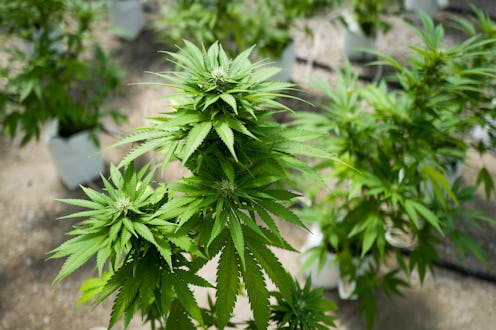News
Focus On Weed This Election Day. Really.
This presidential election will, of course, have an enormous impact on the lives of millions of Americans — and millions who aspire to become Americans. What is often lost in the frenzy about presidential politics, though, are the many ballot initiatives that are voted on the same time. Changes in laws at the state level can make as big a difference as changes in the presidency — if not bigger — to many Americans. This fall, nine states will vote on marijuana legislation, for medicinal or even recreational use, which could have huge significance for millions of Americans.
From my perspective, the most obvious benefit of pot legalization would be the use of marijuana for medicinal purposes. Pot has been used to treat ailments like chronic pain, multiple sclerosis (MS), nausea, and epilepsy. It can also be used to treat anxiety, and some, like Vice's Damien Abraham, have reported that marijuana is a more effective treatment than traditionally prescribed pills, with fewer side effects. Abraham noted:
It seemed that, almost instantaneously, the anxiety subsided, and I relaxed. It was from that moment that I realized I had totally misjudged this plant and medical marijuana as a whole as some hippy bullsh*t. For the rest of that tour I smoked weed and found that my anxiety stopped being an issue.
Some doctors also believe that marijuana can actually help reduce drug addiction problems by taking the place of more addictive prescription medications.
Coupled with marijuana's use in helping patients cope with chemotherapy and in helping seizure patients, the medical possibilities are many.
However, legalizing marijuana, not just medical marijuana, could offer a broader set of benefits. Mass incarceration in the United States is an enormous problem. It wastes taxpayer dollars, promotes recidivism (essentially, someone who has done time is much likelier to return to prison than someone who is not incarcerated), and disproportionately affects black Americans. An ACLU study found that black Americans are 3.73 times more likely to be arrested for marijuana possession than white Americans, despite the fact that both groups use pot at roughly the same rate. Legalizing marijuana would potentially be a significant step towards addressing this injustice.
Moreover, legalizing pot would free up law enforcement resources to identify and prosecute violent crimes. In other areas of law enforcement, resources are stretched painfully thin, like the rape kit backlog problem. Manpower and funding is desperately needed in other areas, yet a recent ACLU / Human Rights Watch report found that marijuana arrests actually outnumber arrests for violent crimes in the United States.
This doesn't mean that marijuana legalization would inevitably benefit Americans. As S.E. Smith at Quartz noted, pot regulations must be carefully constructed in order to enable medical and recreational dispensaries (in states that allow both) to coexist. Under the right circumstances, though, I believe legalization of medicinal or recreational pot use could be as significant to many Americans' lives as the presidential election.
